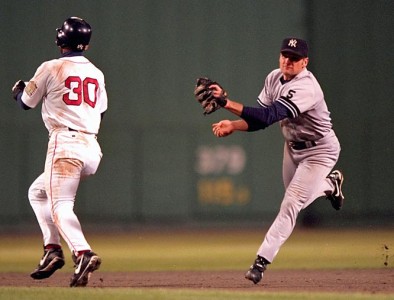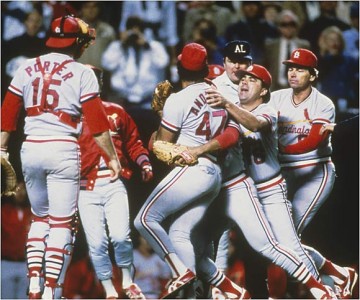After Jim Joyce cost Detroit Tigers pitcher Armando Galarraga a perfect game last week (no. 8), I wanted to compile a list of the worst calls in sports history, the refs and umps are human after all.
10. Florida vs. Tennessee, 2000 – In the fourth quarter with Tennessee holding a slim three point lead, the Gators made an epic drive from deep in their own territory to the Tennessee five yard line. On first down, Jesse Palmer tossed up the ball to wideout Jabar Gaffney. Gaffney dropped the ball, but the play was still called a touchdown and Florida won the game 27-23. I mean sure, if they had called the incomplete pass Florida still could have scored on 2nd or 3rd down and still have won the game, but it’s tough to lose a game on a call like this.
9. Yankees vs. Royals, 1983 – The Royals trailed the Yankees 4-3 in the 9th inning with two outs and a runner on first. George Brett approached the plate and got a hold of a Goose Gossage pitch and knocked it over the fence giving the Royals a 5-4 lead in the 9th. What happened next came out of the blue. Yankee manager Billy Martin walked over to Tim McLelland who was in his first year of professional umpiring. Martin asked for George Brett’s bat to be examined by the umpiring staff because the team was aware of Brett’s use of pine tar on his bat.
The crew measured the bat against home plate, which is 17 inches wide, and ruled Brett out. It was the first game-losing home run in history. However, later in the season the call was reviewed and the league overturned the umpires call and the game was to continue. However, because of his outburst, George Brett was to be ejected from the game, Gaylord Perry was also to be ejected because he told the batboy to hide the bat in the clubhouse, Rocky Colavito and manager Dick Howser were also ejected on the play. The Royals ended up winning in the continuation 5-4.
[youtube]http://www.youtube.com/watch?v=ZrFzGbM_g4Y[/youtube]
8. Tigers vs. Indians, 2010 – Armando Galarraga retired the first 26 batters of the game successfully and he was one out away from pitching the third perfect game of the young 2010 season. He made rookie Jason Donald hit a grounder to Miguel Cabrera at first, Cabrera threw the ball to Galarraga and made what seemed to be the last out, whereupon the crowd erupted with cheers until umpire Jim Joyce signaled that the runner was safe. After the game, Joyce admitted that he blew the call and he apologized to Galarraga, however the imperfect game still stands. The next day, Galarraga brought the lineup card out to a crying Jim Joyce at home plate, then Joyce and Galarraga exchanged pats on the back; Galarraga also got a Corvette for his efforts.
[youtube]http://www.youtube.com/watch?v=bK0gnJojRYQ&feature=related[/youtube]
7. Colorado vs. Missouri, 1990 – The Buffaloes led a huge drive down the field while trailing in the fourth quarter and eventually got first and goal. On first down Colorado spiked the ball. Colorado got stopped twice in a row on the next two tries, but on second down, whoever was controlling the down indicator fell asleep because it did not change when it became third down. So on fourth—er, third, down, Colorado’s quarterback spiked the ball to stop the clock at five seconds. Colorado scored on the next play which was really their fifth down. Colorado went on to win the game 33-31. Colorado shared the 1990 national championship with Georgia Tech.
[youtube]http://www.youtube.com/watch?v=ZQJT8q0MMwQ[/youtube]
6. Yankees vs. Angels, 2009 ALCS – The Yankees were beating the Angels 5-0; Nick Swisher hit a grounder back to the pitcher with runners on second and third, Jorge Posada, the runner on third, broke for home and got caught in a rundown, he started going back to third base. Angels catcher Mike Napoli ran after Posada, when he got close enough to third, he saw that Robinson Cano had made his way to third, but neither Posada nor Cano was touching the bag, Napoli tagged both runners out, but umpire Tim McClelland only called out Posada while both runners were clearly tagged off the base. It was an awful job of officiating, the call didn’t have much effect on the game as the Yankees proceeded to crush the Angels 10-1.
http://mlb.mlb.com/video/play.jsp?content_id=7078739
5. Patriots vs. Raiders, 2002 AFC Championship – Tom Brady was trying to bring his Patriots to Super Bowl XXXVI and the only thing in their way was a hot Oakland Raiders team. With very little time left, and the Pats down by three points, Tom Brady dropped back to pass and was hit by Oakland cornerback Charles Woodson and Brady appeared to have lost control of the ball as a fumble. Raider linebacker Greg Biekert collapsed on the ball, seemingly giving the Raiders the victory and a one-way ticket to the Super Bowl. Since the call was debateable, the officials looked at instant-replay.
Referee Walt Coleman reversed the call, changing the result of the play to an incomplete pass justified by the “tuck rule,” where, if a quarterback drops his arm to pass and changes his mind and controls the ball with his non-throwing hand, the ball is still moving forward and ruled as an incomplete pass. Riding on the leg of Adam Vinatieri, the Patriots made their way to the Super Bowl that year. There was much debate over this play because many still believe the ball was fumbled. The rule itself is hard to enforce, the NFL has tried several times to revise the rule but usually the revisions are just harder to enforce than the original rule.
[youtube]http://www.youtube.com/watch?v=oG7krO7GGfs&feature=related[/youtube]
4. Braves vs. Marlins, 1997 NLCS – In game 5 of the NLCS, Liván Hernández took the hill for the Marlins, with Eric Gregg a.k.a. “The Plump Ump” behind the plate. Hernández went on to get 15 strikeouts in the game with the help from the questionable strike zone of Gregg. While the strike zone was a bit big all game, Fred McGriff took the plate and got rung up on a pitch that was at least a foot outside of the strike zone. McGriff was dumbfounded and the Marlins won because of Hernandez’s great pitching performance, allowing only three hits. Florida won game 6 and made their way to win the 1997 World Series against the Cleveland Indians in 7 games.
3. Argentina vs. England, 1986 FIFA World Cup – In a World Cup semi-final match that is best described by the words, “Hand of God,” Diego Maradona scored both goals for the Argentinians to give them the win 2-1. But the first goal was not anywhere close to legal; Maradona blatantly hit the ball with his left hand scoring the first goal of the game. So I guess this wasn’t really a call as much as it was a no-call, this changed the game in a big way though, as the victory was only by a margin of one. Maradona did, four minutes after his “Hand of God” goal, score what was later named the Goal of the Century where he made a 60 meter dash past five English players to give Argentina a two goal advantage.

2. Yankees vs. Red Sox, 1999 ALCS – The Red Sox were looking to rally against the Yankees in the ninth, but when Chuck Knoblauch “tagged” Jose Offerman while running to second then threw the ball to first the Yanks killed every chance of that happening. However, photos later showed that Knoblauch was a good four feet away from Offerman on the tag. I watched the post-game press conference to see what was said about the call, and umpire Tim Tschida admitted that he missed the call, but referring to Chuck Knoblauch as “Knobby” didn’t sit well with Sox fans. The Yanks won the series in five and proceeded to win the World Series against the Atlanta Braves.
1. Cardinals vs. Royals, 1985 World Series – By far the worst call in the history of sports, Don Denkinger just flat out missed this one. The Cardinals were leading the series 3-2 and just needed three more outs to be world champs. The first batter of the ninth was Jorge Orta, he hit a routine grounder and was out—I mean—safe, according to umpire Don Denkinger. Every photo and replay that everybody and their grandmother has seen indicates that Orta was out by at least a half-step. Cardinals first baseman Jack Clark, their pitcher, Todd Worrell, and the skipper, Whitey Herzog all made multiple protests of the call but to no avail, Denkinger did not change the call and the Royals won the game and went on to win the series.














































John Brice • Jun 19, 2010 at 12:01 am
What about the 1972 Olympic basketball final game in which the US team successfully won then the refs made them redo the final play which resulted in the US team losing the gold. To this day all the players involved have refused their Silver Medal.